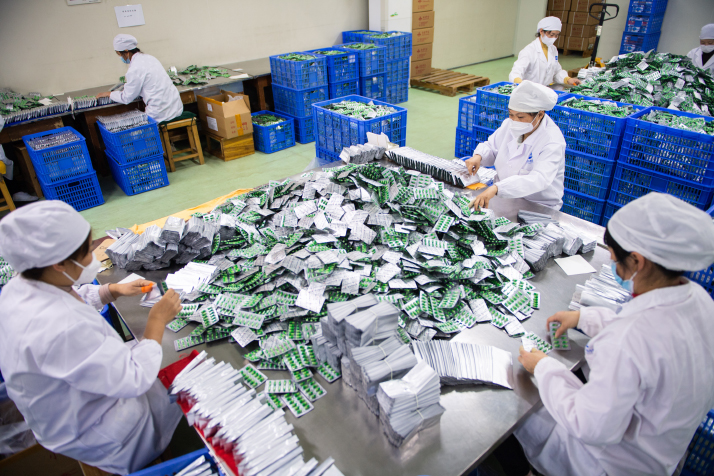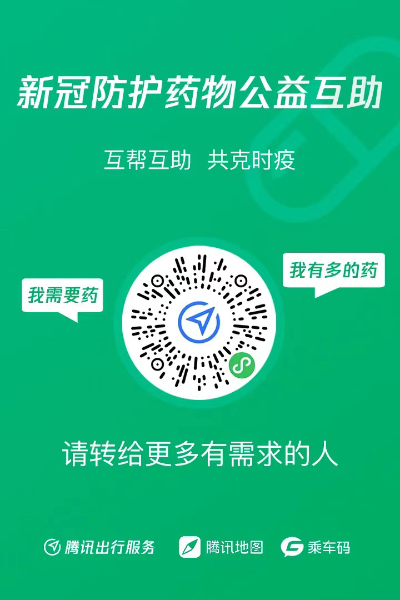| China |
| Pandemic Mutual Aid mini program aims to relieve medication shortage | |
|
|
 Staff sort and pack medicines at a pharmaceutical company in Hunan Province on December 19, 2022 (XINHUA)
From residential compounds to entire neighborhoods, communities across China have been using social media to combat the country's rampant COVID-19 infections in recent weeks. Shortage of basic medication to battle infection got so serious that super app Weixin, also known as WeChat, created by Chinese tech giant Tencent, officially launched a Pandemic Mutual Aid mini program on December 20, 2022 where people post requests for ibuprofen, acetaminophen, rapid antigen test kits and other essentials. Posts from all over the country are refreshing every second. Mini programs are sub-applications within the app's ecosystem. They provide advanced features to users, including virtual store tours, coupons and multiple services. As of late November 16, the number of daily active users of Weixin mini programs exceeded 600 million, a year-on-year increase of more than 30 percent; and its average daily usage rose even faster, at a year-on-year rate of more than 50 percent. Medication shortage "Since December 10, we have seen a number of local governments advising residents to share medication with their neighbors; we realized many people only need two to four ibuprofen tablets to relieve the fever caused by infection," Tencent Intelligent Mobility, the team designing the mini program, told Beijing Review. Together with the Tencent Map team, in charge of the company's desktop and web mapping service application and technology, they went on to create the new platform to support public mutual help, as some people might have some spare medicine to share for free. As the pathogenicity of the Omicron variant was waning and more people had been vaccinated, China decided to scrap most of its COVID-19 control measures late last year. The country issued a notice on optimizing its COVID-19 response on December 7, stating asymptomatic cases and those with mild symptoms would be allowed to quarantine at home from then on, but still offering those infected the choice to seek treatment in centralized facilities. In preparation for the huge influx of fever patients to hospitals, many Chinese cities rushed to open more fever clinics, namely, hospital units that specialize in the screening and treatment of infectious diseases that cause fever. For example, Guangzhou, capital of Guangdong Province, had increased its number of fever clinics from 114 to 199, according to local authorities on December 19, 2022. However, many residents who tested positive, yet with relatively milder symptoms such as muscle or body aches and a cough, with or without a fever, chose to stay at home and self-medicate. Due to a surge in infections and hence in the need for medication, supply of medicine couldn't keep up with demand.  QR code of the Pandemic Mutual Aid mini program launched by Chinese tech giant Tencent Staff sort and pack medicines at a pharmaceutical company in Hunan Province on December 19, 2022 (FILE)
Digital solution As of December 22, two days after its launch, more than 1 million users had entered the Pandemic Mutual Aid mini program, posting over 50,000 messages, according to Tencent. In Shanghai alone, 13,000 requests for aid were posted—with 30 percent answered. To offer as much convenience to users as possible, the mini program matches the posts asking for and offering help by the proximity of their locations. Yao Jingyu, a young woman who does strategic planning at a foreign company in Shanghai, told Beijing Review she'd helped a man living 147 meters from her place. "He needed ibuprofen so I left him four tablets at the front desk of his apartment building," Yao said. "I had just recovered from COVID-19," Yao said, adding she'd decided to check if her leftover medication could benefit anyone after spotting a Weixin notification of the newly launched mini program. Beijing resident Zhao Qinheng received help from a woman living nearby shortly after he'd posted a message asking for COVID-19 antigen rapid test kits and nasal congestion medication. "I left my Weixin account name and phone number on the platform and quickly got a reply," Zhao told Beijing Review. He then found a delivery person to pick up the goods. Yao and Zhao are just two of the many residents across China who have been using the platform in recent weeks. Shenzhen, Hangzhou, Shanghai, Guangzhou, and Nanjing are the top five cities asking for medication and Beijing, Shenzhen, Shanghai, Guangzhou, and Hangzhou are the top five providing help, according to Tencent. Medicines that can be listed on the platform are non-prescription drugs recommended by the National Health Commission, Tencent stated. In order to avoid any type of misuse or hoarding, mini program registration requires real-name verification and the platform has also capped the number of goods that can be shared, i.e., a maximum of four ibuprofen tablets and two antigen kits. Despite stocking up following the government's announcement on December 7, many online stores and brick-and-mortar pharmacies soon ran out of medicines to help relieve COVID-19 symptoms as the virus swept across China. Prior to the mini program's launch, many residents had been already sharing what they could spare via Weixin groups. The mini program simply helps connect supply and demand in a more targeted way. Meanwhile, central authorities have been trying to ramp up medicine production and facilitate distribution. According to Xinhua News Agency, many pharmaceutical companies in China are working at full capacity to produce analgesics, antipyretics, as well as other over-the-counter medicines to treat COVID-19 symptoms. Tech for good Since early 2020, China has developed a slew of technologies in its battle against the virus. For example, the digital travel code, a mini program first launched in March 2020 and taken offline on December 13, 2022, played a key role in the authorities' pandemic prevention policy, by identifying those who had been in high-risk areas. According to an article by Qi Xiaoxia, Director General of the Bureau of International Cooperation at Cyberspace Administration of China, published on the World Economic Forum website on April 8, 2020, 5G has also played an important role in COVID-19 prevention and control, mainly in the field of telemedicine. To make full use of expert resources in large cities and hospitals, the 5G plus remote consultation system was quickly implemented in many hospitals across the country, the article read. New-generation information technologies have unique advantages and can play an important role in responding to major public health challenges, it further stated. Both Yao and Zhao hailed the role of technology in addressing the medication shortage. "The mini program can help many people, indeed," they both agreed. "My family and friends usually have enough medicine at their disposal thanks to them being well prepared, but the pandemic mutual aid platform made me realize just how many people urgently need help," Yao said. "I hope it can continue to help people, and not be misused," Zhao worried. Regarding these concerns, Tencent said the company is constantly trying to increase authenticity reviews of the messages posted on the platform as to avoid such mishaps. Additionally, the platform will add reminders and guidelines related to safe medication and try to contact suppliers, hoping to provide users with more medication choices, Tencent added. "We have been paying great attention to product development in the social emergencies sector, and are exerting the power of technology for good," Tencent concluded. (Print Edition Title: Algorithmic Solidarity) Copyedited by Elsbeth van Paridon Comments to taoxing@cicgamericas.com |
|
||||||||||||||||||||||||||||
|